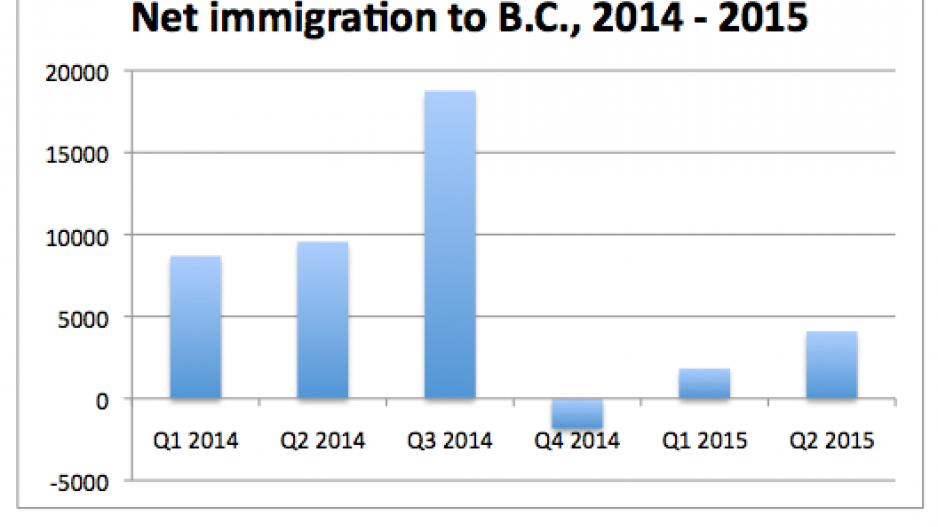B.C.’s Jobs Ministry is blaming the federal government for a 55% drop in immigration numbers in the first half of 2015 – a decline that could affect the province’s real estate and labour markets.
In 2015’s first six months, B.C. immigration numbers fell to their lowest level in 15 years.
“We had expected it to be stronger, and it has caused us to re-evaluate some of our forecasts going forward,” said Bryan Yu, senior economist with Central 1 Credit Union.
Analysts had expected a reduction in non-permanent immigration because of the sudden restrictions imposed on the temporary foreign worker (TFW) program in June 2014. More worrying, Yu said, was a 19% decline in the number of permanent residents in the same period.
B.C.’s Ministry of Jobs, Tourism and Skills Training declined Business in Vancouver’s interview request. But in an email, ministry staff wrote that recent changes to several federal immigration programs are to blame for the falling numbers.
“The introduction of a federal Express Entry system, changes to the TFW program and the cancellation of the immigrant investor program have meant slower processing times and fewer people being admitted to the country,” staff wrote.
The federal Citizenship and Immigration Canada ministry processes 80% of immigrants to B.C., while the province handles 20% of immigrants through its provincial nominee program (PNP). That program allows provinces to set targets and shape their own applicant requirements to respond to labour needs. B.C. will fill 100% of its PNP allocation this year.

After years of loosening the rules by which Canadian employers could hire temporary foreign workers for both skilled and unskilled jobs, the federal government heavily restricted the program in June 2014 after serious abuses of the program came to light. The program was criticized for creating a situation where low-skilled workers, who were not eligible for citizenship, could be exploited by their employers.
The federal immigrant investor program was scrapped in January 2014 and reintroduced in January 2015. The new program allows only 50 applicants per year, who must have a net worth of $10 million. The program had attracted 36,973 wealthy people to British Columbia between 2005 and 2012.

A study commissioned by immigration law firm Kurland, Tobe showed that large numbers of wealthy immigrants are likely still arriving in B.C. through Quebec, which has more control over immigration than other provinces. In 2015, Quebec planned to admit 5,000 immigrant investors, who each must be able to lend the province $800,000. Kurland, Tobe’s study found that many of those applicants then “trampoline” from Quebec to B.C.
Changes to both the immigrant investor and TFW programs have put additional pressure on the provincial nominee program, according to B.C. government documents.
B.C.’s PNP was paused in April because of a backlog of applicants. It restarted in July, then stopped again in September because all of the spots had filled up. B.C.’s PNP entrepreneur program, which was designed to encourage immigrants with business experience to open a business in the province, also underwent changes.
Demand for the entrepreneur program was so great that in the months before the April closure, the B.C. government restricted the program to allow investors to buy only businesses outside of Metro Vancouver, at a minimum of $200,000, said Arthur Klein, a business broker with Pacific Business Brokers.
That led to a gold-rush mentality among some of the potential buyers, some of whom were specifically looking for very small businesses priced at around $200,000 in locations like Vancouver Island and Chilliwack, Klein said.

“I’m aware of other instances where someone was willing to sell and someone was willing to pay, and those transactions happen and those applicants were really trying to run those businesses remotely. Those businesses have been marginalized or suffered as a result.”
Klein added that he had rejected several offers on behalf of clients when buyers did not seem to be serious about running the existing business.
The new criteria include a point system for experience, net worth, adaptability and business concept, which Klein believes will be effective at closing some of the previous loopholes.
“The new rules are much more fundamental to driving benefit back to B.C.,” he said.
The newly elected federal Liberals have criticized the Conservatives’ immigration approach. They said it increased processing times, made the process of becoming a citizen longer and more difficult and “reoriented [immigration] away from welcoming those who choose to make Canada their new and permanent home.”
The party promises to speed up processing times for the Express Entry economic immigration stream.
The B.C. government says it continues to press the federal government to increase its PNP allocation.
– With files from Frank O’Brien
@jenstden




